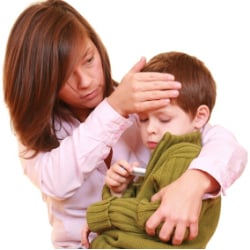
‘Tis the Season…For Colds and Sneezin’
4 October 2012
t’s not clear exactly why the winter months are prime time for flu and colds. It might be the shorter days with dwindling sunlight, or the fact that we’re spending more time indoors in proximity to others. Or it could be that our mucus membranes get dried out. Or a combination of these factors. Whatever the reason, ‘tis definitely the season for colds and sneezin’ for old and young alike.
Both influenza (also known as “the flu”) and colds are infections of the upper respiratory tract, which includes the nose, throat, ears and sinuses. And both are caused by viruses.
Colds
Colds involve stuffy or runny noses, sneezing, sore throats, coughing, fever and fatigue. They can last from two to four days. People may get colds a number of times throughout the winter season, since there are hundreds of different types of cold viruses. Typically, a cold won’t last too long. You can treat your children’s colds with the appropriate painkillers – be sure to ask your physician about these – as well as decongestant ointments and vaporizers. Most of the time, colds are not serious, although they can lead to bacterial infections. Be sure to wash your hands to avoid spreading colds.
Get your child to drink plenty of fluids. You can also put salt-water drops into your baby’s nose to loosen mucus. You can remove mucus from your baby’s nose with a rubber suction bulb. A vaporizer or humidifier in your child’s room can also help to loosen nasal mucus. For fever or pain, you can give your child acetaminophen (Tylenol or Tempra) or ibuprofen (Motrin or Advil). Do not give your child ASA (acetylsalicylic acid or Aspirin).
Talk to your doctor before you give any cold medicines to a young child. Never give these medicines to a child under one year old. Also note that antibiotics do not work on cold viruses.
Keep an eye on your child
You’ll need to call his doctor if one of the following scenarios develops:
- Your youngster is under three months old and develops fever;
- Your young child’s fever lasts more than five days;
- Runny nose lasts more than 10 days;
- There’s yellow discharge in your child’s eyes;
- Your baby can’t drink enough because his nose is too stuffy;
- Your child has chest pain;
- Your child has ear pain and/or fluid draining from the ear;
- Your child develops a very sore throat.
Contact the nearest Emergency Department or call 911 if:
- Your child looks more ill;
- He seems lethargic – very sleepy or irritable – cranky;
- He is having trouble breathing;
- His lips look blue;
- Or he has a painful or stiff neck or a severe headache.
The flu
Those at high risk for flu should be vaccinated. These include the elderly, people with chronic conditions, and the young. Those who work near or live with these higher-risk groups should also receive flu vaccinations.
The flu vaccine changes every year, based on the most common influenza viruses during the coming flu season, which runs from December through March.
Flu spreads easily from one person to the next through coughing and sneezing; and through touching an object which has itself been in contact with someone with the flu. So, in addition to the flu shot, thorough hand washing also plays a big part in flu prevention. Cover your mouth and nose with a tissue when you sneeze. Throw away this tissue…and again, wash your hands. And please do not visit the hospital if you are ill or have flu symptoms.
You can manage your child’s flu by ensuring he gets plenty of rest, plus the right medication to bring his temperature back to normal. Ask your doctor about acetaminophen (Tylenol) for fever reduction. Your child should also drink plenty of fluids. You could also lower the room temperature if your child has a fever. The flu can be more serious for some people, including children and teenagers ranging in age from six months to 18 years old who have been treated with ASA (acetylsalicylic acid, or Aspirin) for long periods; as well as children under two years of age.
There is also special flu medication for patients one year old and older. Your child’s doctor can tell you more.
Getting the flu in while hospitalized
If your child has the flu while hospitalized, he will be placed in a single room and will not be able to visit the playroom. Toys and other supplies can be brought to his room. You can also let your child know that hospital staff will need to wear masks, eye protection, gloves and gowns when they enter his room. As the parent of a child with the flu, you should wash your hands frequently, before and after you touch your child, and before you leave your child’s room. Hospital staff will be washing their hands as well. If you or a family member becomes ill with flu-like symptoms after visiting your child, you need to tell this to your child’s doctor or nurse.
To find out more about flu and cold cures – and prevention, ask your family doctor. Anyone older than six months should have a flu shot, unless there is a reason not to. And remember, flu vaccination season begins well before flu season starts. Typically, the body will need about two weeks after the flu shot to build up protection, which will last for about six months.
